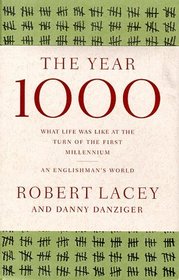One of the best books I've read in quite a while. It is organized around the Julius Work Calendar, and discusses a different activity in normal life every month. The authors acknowledge that there is not a lot of information out there about how life was like in 1000, so a lot of there information is in the years before and after 1000. There's a fair amount on the Y1K problem, since the book was written in 1999, when Y2K was looming.
Donna W. reviewed The Year 1000: What Life Was Like at the Turn of the First Millennium : An Englishman's World on + 107 more book reviews
Very informative book
I really enjoyed this book! One must remember that it is purely about England, and that the year 1000 is before the invasions of William the Conqueror in 1066. So there are no Norman castles, no Saxon/Norman conflicts, and not all of the island of Britain is Christianized. This is definitely not *Ivanhoe*. However, it is full of fascinating information, both about the life in the countryside and the life in the towns, which are much more numerous than we expect. The book dispels the myth that villagers did not travel anywhere and knew no world except their own village. This might be true for the slaves or villeins, who were truly bound to the land, but otherwise there was plenty of coming and going between villages and towns. One would travel to visit family, or to attend a market at a market town (not all towns were allowed to have markets), to go to a funeral of a relative (possibly hoping to be named in the will), to go to a notary in case of land disputes, etc. Or you might go on pilgrimage to one of the shrines (not Canterbury, St. Thomas Becket hadn't been murdered yet), but there were plenty of English saints, almost forgotten today.
Great source of information. I might not re-read it straightaway, but I certainly will keep it around for a while
Great source of information. I might not re-read it straightaway, but I certainly will keep it around for a while




